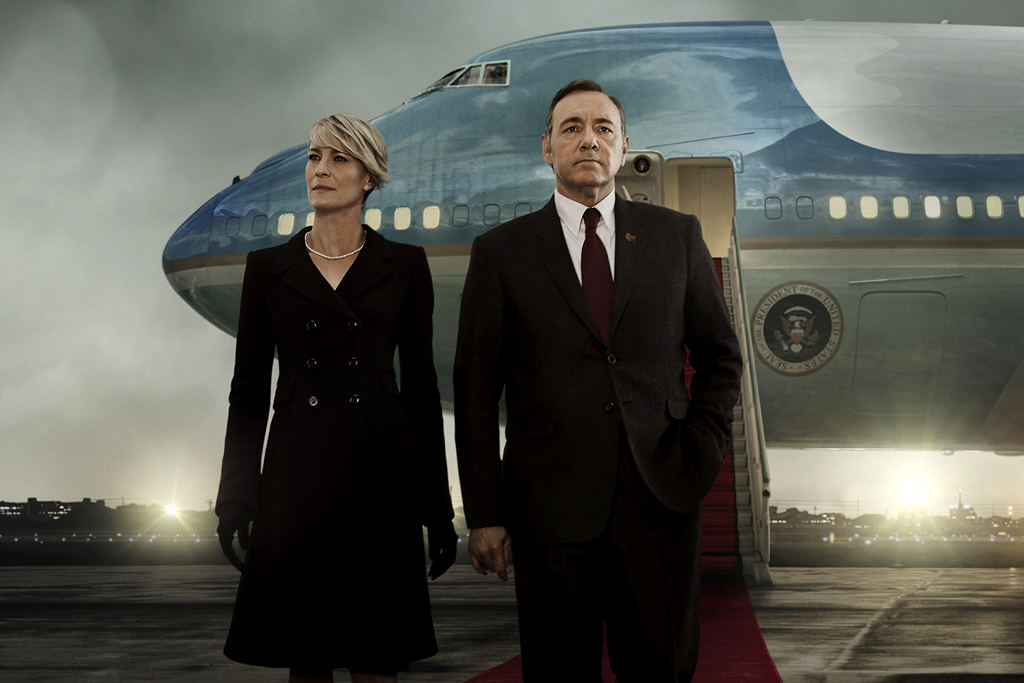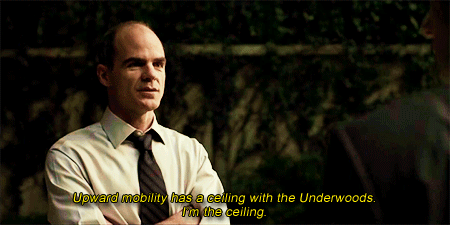House Of Cards Hangover: In Season Three, The Underwoods Lose Their Way
We binge-watched House Of Cards' third season, but should you?

Anticipation can be a real bitch. House of Cards gave us two knockout seasons of political bloodlust, intrigue, the Cult of Claire Underwood (Clinton/Underwood 2016!). Did we have it too good? Sadly, season three of HoC did not (and perhaps could never) live up to our expectations.
House of Cards is a series not about the making of a political power couple, but rather their eventual undoing. A house of cards can be relied on to do one thing: fall. So with the full deck now in place, why did beginning of the end of the Underwoods fall short?
–
Doug, Out
Just like the Craigslist that Doug uses to find booze-enabling sex workers, this season was full of missed connections. The first reveal, at the top of episode one, was that Underwood’s Chief of Staff Doug Stamper is alive (season two ended with Rachel Posner, the object of Stamper’s perverse affections, clubbing him in the head and leaving him in the woods). Unfortunately for Doug (and us), as the season progresses we’re left kind of wishing he didn’t make it.
Doug’s season three arc begins with a slow recovery from his physical injury, but he is profoundly more injured by his ejection from the Underwood’s inner circle. Doug spends much of the season attempting re-entry, eventually earned via the infiltration of Heather Dunbar’s presidential campaign and dealing with the Rachel “problem” (by hunting her down and murdering her).
Doug’s one-sided relationship with Rachel began and ended with acts of violence committed off-screen, from forcing her to engage in sex work to her eventual death. Empathising with Doug is therefore tricky-to-impossible (depending on how funny you think Daniel Tosh is). Frank can push a young woman in front of a moving train or unseat a sitting President and we boo with glee, playing our part in the political pantomime. There is no perverse joy from observing Doug’s personal brand of villainy, given it was the prolonged psychological and physical torment of a young woman.
Much time was dedicated to humanising Doug this season, including re-connecting with his estranged family (“We’re huggers!” exclaims Doug’s sister-in-law, who might as well be speaking a foreign language in the House of Cards universe). He grieves deeply for Rachel when he thinks she’s dead, and at the end of the season he very nearly lets her go instead of killing her — before quickly doubling back and killing her anyway.
Doug’s ill-fated attempt at redemption was one of several odd plays made by the writers in season three. Doug is best as the Underwood attack dog, and while season three has all the main characters adrift in the new universe of the White House, Doug’s narrative as an outsider lacked the empathy required to stay engaged.

This is central to the issues of season three as a whole. We had come to understand the rules of the House of Cards universe asa world of vengeance and bile where a man who would eventually become President of the United States of America believably (and still somehow theatrically) is a murderer. Fitting, as House of Cards’ universe is one of political pantomime in which livelihoods, careers and legacies are laid waste for the ambition of a husband and wife team. The Underwoods, a pair of modern-day Macbeths (as we came to love them) would stop at nothing to achieve their ends.
–
President Frank Underwhelm
Yet in season three, Frank Underwood’s occupation of the throne now complete (if not grasped tenuously) lacks the excitement of previous seasons. Perhaps this is no more than a standard issue in TV: what to do when a character gets what they want? The reality of life in the Oval Office made for some less-than-exciting moments. Frank wonders aloud if such symbolic power is more symbol than actual power. “What are we doing this for?” Claire asks, in one form or another, repeatedly this season.
In his former roles as Whip and then Vice President, Underwood is pure political animal. Now, he is rendered a man limited by his station. Where once he could bully and scheme, murder or destroy, now he must rule and muse. Play the part of President, highly visible and incapable of anonymity. With such a change in responsibilities, the very nature of the HoC drama changes too. Bureaucracy, Majority House Leaders, and global power dynamics replaced the kidnapping, killing, and cunnilingus of previous seasons.
To that, this season the lemonade was a little flat for the bi-curious polyamorous Underwoods, who usually only come out at night. Last time we saw them, they were making a delicious Home-Brand Justin Theroux sandwich with Meechum, the tasty Secret Service agent.

It was a brilliant moment, all the more because it was left thoroughly unexplained: just another glimpse into what makes Frank and Claire tick. This season it felt like Frank was more interested in fucking his biographer than his wife, who slept in a separate bed most of the season. Frank even goes as far as shaming Claire for demanding rough sex from him, and suddenly the Underwoods were more Revolutionary Road than Eyes Wide Shut.
At the heart of the last two seasons of HoC has been this mystique around the Underwoods. Much was left unanswered, but we knew that like the Macbeths, this is a marriage of ambition, the meeting of two forceful minds not adverse to action. A marriage of pure political economy, seemingly bereft of the suburban insecurities that affect most relationships.
–
Horny Writer Seeks Same
Speaking of suburban relationships, what we were treated to was an excess of horny-writers subplot. When seasoned journalist Kate Baldwin (Kim Dickens) arrives at the White House, I thought HoC finally found a plucky journo to pick up the Zoe Barnes baton (Barnes of course memorably departed the HoC universe when she caught a train…with her face). However Baldwin’s potential as an agent of j’accuse is all but cast aside in favour of her sexual relationship with Frank’s biographer, Thomas (Paul Sparks).

In a season strangely concerned with the nature of intimate relationships, we sadly saw far less of the Ross and Rachel of HoC, Remy Danton and Jackie Sharp (played by the excellent Mahershala Ali and the Widow Garrett, Molly Parker). In only capturing glimpses of their depth of feeling for one another, we were actually privy to far more – a testament to the investment in them by HoC writers and the skill of the actors. By season’s end, Jackie and Remy have both turned their backs on Team Underwood, a decision that would have been political suicide in earlier seasons (if not genuinely life-threatening). Now though, Underwood’s undoing seems more likely as the forest edges closer to Macbeth’s castle.
–
We’ll Always Have Claire
By the time said forest has reached Macbeth, his wife had flung herself off a tower, sent mad with guilt and unable to wash the imagined blood off her hands. While season three ends with Claire metaphorically flinging herself from the White House, it wasn’t guilt that drove her to jump. Instead, Claire realises that Francis (as only she calls him) has been replaced by President Frank Underwood. Claire understands the partnership is over when Frank, full of sound and fury, verbally attacks her as if she is simply another disappointing soldier in his dwindling army. “I should never have made you President,” said Claire several episodes earlier, and it may just be the line of the series (I’d definitely wear it on a t-shirt).

Storylines in which we observe Claire process, and challenge, her role as wife-of-the-powerful have been a trademark of the series. In season three, though, Claire-as-First-Lady is hemmed in by the inherently gendered aspects of that role, and her attempts to go beyond it as a UN ambassador are thwarted. One of the most powerful episodes of the season sees Ambassador Underwood travel with her husband to Moscow to bring home an imprisoned gay rights activist while concurrently securing Russian support for peacekeeping in the Middle East.
Like all the Underwood’s plans this season, things go sour when the activist hangs himself with Claire’s scarf rather than read a statement recanting his actions. What ensues is a rare-yet-welcome bold (and more importantly ethically motivated) moment from Claire, in which she admonishes the Russian President at a press conference. Ultimately Claire’s act of good is punished when President Petrov claims her scalp as UN ambassador.
It’s not the only time the Underwoods pay the price for choosing to do what is morally correct, the opposite of their standard modus operandi. Early in the season, Frank has the opportunity to destroy the career of a Supreme Court Judge, to move Democratic presidential hopeful Heather Dunbar away from the race and onto the bench. He falters, though, telling us directly that he will not destroy the life of a good man.
These moral quandaries are a clear a sign as any that we have entered the second half of Macbeth, in which the bloody deeds are left behind and what we are faced with are two people haunted by their decisions. Towards the end of the play, Macbeth realises that it’s all been for nothing and muses on the nature of life, that it is a “tale told by an idiot: full of sound and fury, signifying nothing.”
Much of Frank in season three was all sound and fury, but without the Machiavellian intrigue and villainous delight that we enjoyed in previous seasons. However, comparisons with Macbeth are useful only up to a point: Macbeth is a play, with three acts and a definite ending. HoC already has a fourth season confirmed, and who knows where to from there?
After ingesting all of season three, it becomes apparent that the detailed work put into the foundation of HoC by show runner Beau Willimon is beginning to fray at the edges. The tension between creating great television and long-running television is nothing new, as more than one great series has lost its sheen as the years go on. Perhaps when considering the lifespan of HoC, its writers should heed the words of Lady Macbeth: “If it were done, when tis done, then t’were well it were done quickly.”
–
Nic Holas is a writer who focuses on the contemporary gay experience, and being a person living with HIV. You can find him on Twitter @nicheholas.